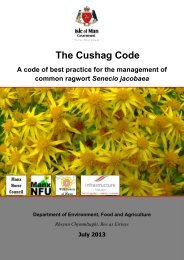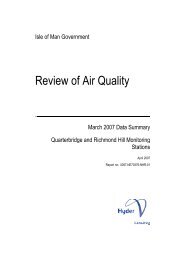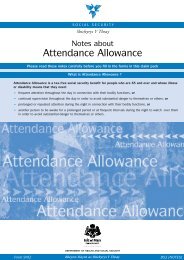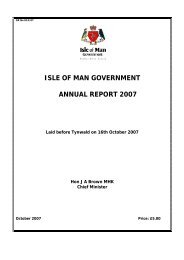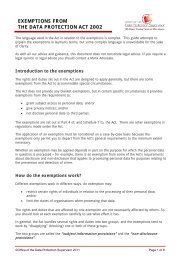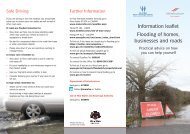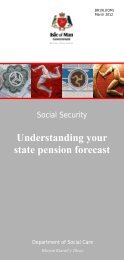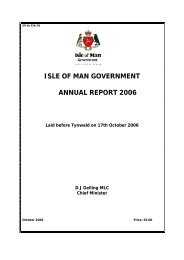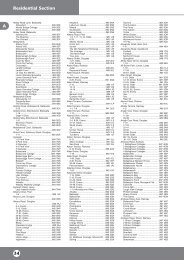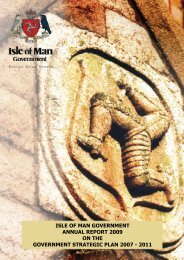MNH Trustees information pack - Isle of Man Government
MNH Trustees information pack - Isle of Man Government
MNH Trustees information pack - Isle of Man Government
Create successful ePaper yourself
Turn your PDF publications into a flip-book with our unique Google optimized e-Paper software.
Council <strong>of</strong> Ministers - Public Appointments<br />
Appointment <strong>of</strong> <strong>Trustees</strong>:<br />
<strong>Man</strong>x National Heritage<br />
(<strong>Man</strong>x Museum and National Trust)<br />
Information Pack<br />
January 2012
1. Recruitment Process<br />
Introduction<br />
The application process for public appointments is fair, open and transparent with appointments<br />
being made on merit, passed on a person’s skills and experience. Members <strong>of</strong> the public are<br />
invited to review the details containing within this <strong>information</strong> <strong>pack</strong> relating to the appointment <strong>of</strong><br />
<strong>Trustees</strong> <strong>of</strong> the <strong>Man</strong>x National Heritage (<strong>Man</strong>x Museum and National Trust).<br />
Interest applications are invited to submit a complete application form, which can be accompanied<br />
by a CV. The closing date for applications is 5.00pm on Monday 20 February 2012.<br />
Applications can be submitted either via email to publicappointments@cso.gov.im or by post to the<br />
Chief Secretary’s Office, <strong>Government</strong> Office, Bucks Road, Douglas, <strong>Isle</strong> <strong>of</strong> <strong>Man</strong>, IM1 3PN.<br />
Timescale<br />
All applications received with be assessed against the require criteria by the interview panel. Shortlisted<br />
applicants will be invited for an interview with the panel. It is anticipated that following the<br />
short-listing process, interviews will be held by mid-March 2012. The appointment <strong>of</strong> the <strong>Trustees</strong><br />
will require the approval <strong>of</strong> both the Council <strong>of</strong> Ministers and Tynwald.<br />
Applicants will be kept fully informed <strong>of</strong> the status <strong>of</strong> their application throughout the process by<br />
the Chief Secretary’s Office.<br />
Future Public Appointments<br />
Any person who wishes to be kept informed about forthcoming Council <strong>of</strong> Ministers public<br />
appointments can register their details at www.gov.im/cso/publicappointments or by via the Chief<br />
Secretary’s Office (contact details above). Persons registered will receive notification appointments<br />
as soon as they are advertised.<br />
1
2. Background Information<br />
Introduction<br />
<strong>Man</strong>x National Heritage (<strong>MNH</strong>) exists independently by Statute on behalf <strong>of</strong> the <strong>Man</strong>x community<br />
to preserve, protect and communicate the unique qualities <strong>of</strong> the <strong>Man</strong>x natural and cultural<br />
heritage. It operates under the authority <strong>of</strong> the <strong>Man</strong>x Museum and National Trust Act 1959 (as<br />
amended).<br />
<strong>MNH</strong> is the Statutory Body <strong>of</strong> the <strong>Isle</strong> <strong>of</strong> <strong>Man</strong> <strong>Government</strong> responsible for the Island’s heritage.<br />
The <strong>Isle</strong> <strong>of</strong> <strong>Man</strong> <strong>Government</strong> provides strong support, including the funding required for the core<br />
activities <strong>of</strong> the organisation, together with specific funding for capital developments.<br />
Although <strong>MNH</strong> is not a Department <strong>of</strong> <strong>Government</strong>, it is subject to the same regulations and<br />
control <strong>of</strong> staffing, resources and financial regulations as <strong>Government</strong> Departments and the<br />
<strong>Government</strong> Code also applies as it does to Statutory Boards. <strong>MNH</strong> works closely with <strong>Government</strong><br />
agencies and the Director <strong>of</strong> <strong>MNH</strong> reports directly to the Chief Secretary.<br />
<strong>Man</strong>x National Heritage also has the Statutory title <strong>of</strong> “The <strong>Man</strong>x Museum and National Trust”<br />
(MMNT), this body is also a registered charity in the <strong>Isle</strong> <strong>of</strong> <strong>Man</strong> (no. 603) reflecting its charitable<br />
role within the community. It administers a private charitable fund comprising donations and<br />
legacies from the public which is separate from <strong>Government</strong>’s annual financial support. The<br />
National Museum Collections are also legally designated as charitable.<br />
Trust Membership<br />
The <strong>Man</strong>x Museum and National Trust (Amendment) Act 2011 introduced changes to the structure<br />
and appointment <strong>of</strong> the <strong>Trustees</strong>.<br />
The new MMNT is comprised <strong>of</strong> a Chairperson plus at least 8 but no more than 14 other <strong>Trustees</strong>.<br />
The Minister for Community, Culture and Leisure appoints one Trustee who is a political member<br />
<strong>of</strong> that Department. The remaining <strong>Trustees</strong> and the Chairperson are appointed by Council <strong>of</strong><br />
Ministers on the advice <strong>of</strong> an interview panel. Appointments to the MMNT are held for a period up<br />
to 5 years (persons can be reappointed for up to 2 terms). The appointments are subject to the<br />
approval <strong>of</strong> Tynwald.<br />
The interview panel which selects the <strong>Trustees</strong> comprises the Minister for Community, Culture and<br />
Leisure, the Departmental Member appointed as a Trustee and two other lay persons appointed by<br />
the Council <strong>of</strong> Ministers.<br />
Functions <strong>of</strong> the Trust<br />
<strong>MNH</strong> is the national heritage organisation for the <strong>Isle</strong> <strong>of</strong> <strong>Man</strong>. It combines the statutory<br />
responsibility for a complete portfolio <strong>of</strong> heritage assets on behalf <strong>of</strong> the <strong>Government</strong> and the<br />
people <strong>of</strong> the <strong>Isle</strong> <strong>of</strong> <strong>Man</strong>. These responsibilities include:<br />
• operating eleven museum sites open to the public.<br />
2
• providing for the protection <strong>of</strong> monuments throughout the landscape, administering the<br />
National Monuments Record and controlling all archaeological investigations within the<br />
Island.<br />
• preserving, protecting and managing important landscape areas <strong>of</strong> natural beauty and<br />
ecological significance, including biological records and operating two visitor centres.<br />
• preserving, making available to the public and facilitating research about the national<br />
collection <strong>of</strong> <strong>Man</strong>x printed works, archives, photographs and film which, in effect, comprise<br />
the national memory and operating the Library and iMuseum.<br />
• collecting and displaying important examples <strong>of</strong> art produced in or about the Island<br />
throughout history, including work by contemporary artists.<br />
Activity and Outcomes<br />
Much <strong>of</strong> what <strong>MNH</strong> achieves is done in partnership with others whose aims and aspirations are<br />
shared, this can be summarised in the following statements:<br />
• Act as guardian <strong>of</strong> the Island’s unique heritage and cultural assets.<br />
• Strengthen the <strong>Man</strong>x identity and community by giving opportunities for enjoyment,<br />
learning and development.<br />
• Contribute to the national economy and infrastructure by making the <strong>Isle</strong> <strong>of</strong> <strong>Man</strong> a better<br />
place in which to live, work and visit.<br />
• Research and communicate the significance <strong>of</strong> <strong>Man</strong>x heritage and culture.<br />
• <strong>Man</strong>age itself effectively, efficiently and accountably.<br />
Chairperson<br />
Interested applicants are invited to mark on their application if they would wish to be considered<br />
to be appointed to the position <strong>of</strong> Chairperson <strong>of</strong> the MMNT.<br />
Legislation<br />
The <strong>Man</strong>x Museum and National Trust Act 1959 (as amended) identifies the core statutory<br />
functions <strong>of</strong> the Trust.<br />
Further <strong>information</strong><br />
www.gov.im/mnh<br />
3
3. Role Pr<strong>of</strong>ile<br />
Key Responsibilities <strong>of</strong> Members<br />
i) Statutory Functions<br />
Oversee the statutory function <strong>of</strong> <strong>Man</strong>x National Heritage as set out in the <strong>Man</strong>x Museum<br />
and National Trust Act 1959 (as amended).<br />
ii)<br />
iii)<br />
iv)<br />
Strategy<br />
Set the Trust’s strategic direction, determining its strategic aims, objectives and policy<br />
framework objectives.<br />
Resources<br />
Ensure the necessary financial and human resources are in place to enable the Trust to<br />
meet its objectives.<br />
Performance<br />
Monitor progress towards objectives.<br />
v) Corporate Governance and Risk<br />
Ensure the high standards <strong>of</strong> corporate governance are observed and adopt an effective<br />
approach to risk management that is robust and defensible. A Trustee should be able to<br />
comply with the <strong>Isle</strong> <strong>of</strong> <strong>Man</strong> <strong>Government</strong>’s Corporate Governance Principles and Code <strong>of</strong><br />
Conduct and Part 6 <strong>of</strong> the <strong>Government</strong> Code which relates to Members <strong>of</strong> Statutory Boards<br />
and Other Statutory Bodies as it applies to <strong>MNH</strong>.<br />
vi)<br />
vii)<br />
Values and standards<br />
Set the Trust’s values and standards ensuring that employees and volunteers know what<br />
standards <strong>of</strong> conduct are expected <strong>of</strong> them.<br />
Communication<br />
Ensure that effective communication exists between the Trust and its stakeholders,<br />
particularly the public, <strong>Government</strong> and Tynwald.<br />
Time Commitment Required<br />
i) Number <strong>of</strong> meetings held per annum<br />
The full Trust meetings occur at least every two months. There may be informal and formal<br />
sub-committee meetings, in addition, which may occur once per month.<br />
ii)<br />
iii)<br />
iv)<br />
Location <strong>of</strong> meetings<br />
Meetings are usually held at the <strong>Man</strong>x Museum, Kingswood Grove, Douglas.<br />
Approximate duration <strong>of</strong> each meeting<br />
Full Trust meetings can take up to three hours.<br />
Preparation time required prior to meetings<br />
Trustee papers are issued one week in advance <strong>of</strong> the full Trust meeting.<br />
4
v) Additional duties outside Trust meetings<br />
There is an expectation that <strong>Trustees</strong> attend events undertaken or hosted by the Trust.<br />
Key Competencies and Behaviours<br />
<strong>Trustees</strong> should:<br />
• Make an effective impartial contribution to the work <strong>of</strong> the Trust and have the ability to<br />
demonstrate sound judgment. They should command trust and respect and be able to<br />
manage politically sensitive situations, acting with integrity.<br />
• Maintain independence <strong>of</strong> judgment and avoid conflicts <strong>of</strong> interest, acting in good faith in<br />
the Trust’s best interests.<br />
• Constructively scrutinise and contribute to the development <strong>of</strong> strategy and scrutinise the<br />
performance <strong>of</strong> the organisation in meeting agreed goals and objectives<br />
Remuneration<br />
<strong>Trustees</strong> are entitled to payment under The Payment <strong>of</strong> Members’ Expenses Act 1989, and The<br />
Payment <strong>of</strong> Members’ Expenses (Specified Bodies) Order 2003 as follows:-<br />
Attendance Allowance:<br />
£78.00 per session<br />
Travelling Allowance:<br />
Up to 1299cc<br />
1300cc and above<br />
£0.46 per mile<br />
£0.52 per mile<br />
Conflicts <strong>of</strong> Interest<br />
A “Guide for Applicants for Membership <strong>of</strong> the <strong>Man</strong>x National Heritage” is attached as an Appendix<br />
to this document.<br />
5
4. Person Specification<br />
Qualifications<br />
• Academic and/or pr<strong>of</strong>essional qualifications relevant to the Trust’s key responsibilities<br />
are very desirable. <strong>Trustees</strong> are appointed to reflect the diversity <strong>of</strong> the <strong>Man</strong>x<br />
community and also support the Director and pr<strong>of</strong>essional staff. They have to have<br />
the respect <strong>of</strong> the community and be able to work alongside paid staff and volunteers.<br />
Experience<br />
• Significant experience at a senior level in either management or governance <strong>of</strong> the<br />
public, private or voluntary sectors is essential.<br />
• Experience or interest in areas within the Trust’s responsibilities would be desirable.<br />
These include the history and archaeology <strong>of</strong> the Island, art and design, language and<br />
customs, farming and land management, biodiversity and ecology, archives and<br />
libraries, retail and catering, building conservation and planning, charitable giving and<br />
fundraising.<br />
Knowledge and skills<br />
• Leadership and motivational skills.<br />
• An understanding <strong>of</strong> strategic and business planning, resource and risk management.<br />
• The ability to analyse and review complex and sensitive issues, weighing up conflicting<br />
opinions and identify appropriate actions.<br />
• A good understanding <strong>of</strong> and respect for both the public, private and voluntary sectors<br />
and the factors that influence them.<br />
• Basic IT capability is required in order to receive and respond to electronic<br />
transmissions.<br />
• Financial probity and honesty.<br />
• The ability to understand financial <strong>information</strong>.<br />
Disposition<br />
• The highest standards <strong>of</strong> integrity and honesty in full compliance with the seven<br />
principles <strong>of</strong> public life.<br />
• The ability to develop good working relationships at both Trust and staff level,<br />
together with the ability to maintain the respect <strong>of</strong> stakeholders <strong>of</strong> the Trust.<br />
Circumstances<br />
• The ability to commit to the role pr<strong>of</strong>ile as outlined.<br />
6
5. APPENDIX<br />
“Conflicts <strong>of</strong> Interest –<br />
A Guide for Applicants for Membership <strong>of</strong> <strong>Man</strong>x National Heritage”<br />
The Seven Principles Underpinning Public Life<br />
The <strong>Government</strong> Code requires members <strong>of</strong> <strong>Man</strong>x National Heritage at all times to exercise the<br />
highest standards <strong>of</strong> behaviour in line with the seven principles <strong>of</strong> public life. The principles <strong>of</strong><br />
public life are as follows:<br />
Selflessness<br />
Holders <strong>of</strong> public <strong>of</strong>fice should take decisions solely in terms <strong>of</strong> the public interest. They should<br />
not do so in order to gain financially or other material benefits for themselves, their family, or<br />
other friends.<br />
Integrity<br />
Holders <strong>of</strong> public <strong>of</strong>fice should not place themselves under any financial or other obligation to<br />
outside individuals or organisations that might influence them in the performance <strong>of</strong> their <strong>of</strong>ficial<br />
duties.<br />
Objectivity<br />
In carrying out public business, including making public appointments, awarding contracts, or<br />
recommending individuals for rewards and benefits, holders <strong>of</strong> public <strong>of</strong>fice should make choices<br />
on merit.<br />
Accountability<br />
Holders <strong>of</strong> public <strong>of</strong>fice are accountable for their decisions and actions to the public and must<br />
submit themselves to whatever scrutiny is appropriate to their <strong>of</strong>fice.<br />
Openness<br />
Holders <strong>of</strong> public <strong>of</strong>fice should be as open as possible about all the decisions and actions that they<br />
take. They should give reasons for their decisions and restrict <strong>information</strong> only when the wider<br />
public interest clearly demands.<br />
Honesty<br />
Holders <strong>of</strong> public <strong>of</strong>fice have a duty to declare any private interests relating to their public duties<br />
and to take steps to resolve any conflicts arising in a way that protects the public interest.<br />
Leadership<br />
Holders <strong>of</strong> public <strong>of</strong>fice should promote and support these principles by leadership and example.<br />
All candidates who put themselves forward for public appointment must be able to demonstrate<br />
their commitment to the principles and values <strong>of</strong> public service.<br />
It is important that the candidate’s commitment to the probity principle is tested and assessed at<br />
interview. One <strong>of</strong> the issues which might arise in relation to this is that <strong>of</strong> conflict <strong>of</strong> interest.<br />
7
What is a conflict <strong>of</strong> interest?<br />
Public appointments require the highest standards <strong>of</strong> propriety, involving impartiality, integrity and<br />
objectivity, in relation to the stewardship <strong>of</strong> public funds and the oversight and management <strong>of</strong> all<br />
related activities. This means that any private, voluntary, charitable or political interest which<br />
might be material and relevant to the work <strong>of</strong> the body concerned should be declared.<br />
There is always the possibility for real or perceived conflicts <strong>of</strong> interest to arise. Both are a<br />
problem, as the perceived inference <strong>of</strong> a conflict may, on occasions, be as damaging as the<br />
existence <strong>of</strong> a real conflict.<br />
It is important, therefore, that you consider your circumstances when applying for a public<br />
appointment and identify any potential conflicts <strong>of</strong> interest, whether real or perceived.<br />
Surely a perceived conflict is not a problem, as long as I act impartially at all times?<br />
The integrity <strong>of</strong> the individual is not in question here. However, it is necessary for the standing <strong>of</strong><br />
the individual and the Trust that members <strong>of</strong> the public have confidence in their independence and<br />
impartiality. Even a perceived conflict <strong>of</strong> interest on the part <strong>of</strong> a trust Member can be extremely<br />
damaging to the body’s reputation and it is therefore essential that these are declared and<br />
explored in the same way as an actual conflict would be. The fact that a Member acted impartially<br />
may be no defence against accusations <strong>of</strong> potential bias.<br />
What should I do if I think I have a conflict <strong>of</strong> interest?<br />
You will find a section on conflicts <strong>of</strong> interest in the application form for you to complete. This<br />
asks you to consider and declare whether or not you have a real, or perceived, conflict. If you are<br />
unsure if your circumstances constitute a possible conflict, you should still complete this section, in<br />
order to give the Selection Panel as much <strong>information</strong> as possible.<br />
If I declare a conflict, does this mean I will not be considered for appointment?<br />
No – each case is considered individually. If you are shortlisted for interview, the Panel will<br />
explore with you how far the conflict might affect your ability to contribute effectively and<br />
impartially on the Trust and how this might be handled, if you were to be appointed. For<br />
examples, it may be possible to arrange for you to step out <strong>of</strong> meetings where an issue is<br />
discussed, in which you have an interest. However, if, following the discussion with you, the Panel<br />
believes that the conflict is too great and would call into question the probity <strong>of</strong> the Trust or the<br />
appointment, they can withdraw your application from the competition.<br />
What happens if I do not declare a known conflict, which is then discovered by the<br />
Trust after my appointment?<br />
Again each case would be considered on its merits, but a view may be taken that by concealing a<br />
conflict <strong>of</strong> interest, you would be deemed to have breached the Seven Principles <strong>of</strong> Conduct<br />
Underpinning Public Life and your appointment terminated.<br />
What happens if I do not realise a potential conflict exists?<br />
This situation may arise where the applicant is not familiar with the broad range <strong>of</strong> work which a<br />
body covers and therefore does not realise that a conflict might exist. In some cases, the Panel,<br />
with their wider knowledge <strong>of</strong> the body, might deduce that there is a potential conflict issue, based<br />
8
on the <strong>information</strong> on employment and experience provided by the candidate in the application<br />
form. They will then explore this at interview with the candidate.<br />
What happens if a conflict <strong>of</strong> interest arises after an appointment is made?<br />
This could arise for two main reasons. The first is that the Member’s circumstances may change,<br />
for example, they may change jobs and in doing so, a conflict with their work on the Trust<br />
becomes apparent. The second is where a Member is unfamiliar with the range <strong>of</strong> the work <strong>of</strong> the<br />
body, but after appointment, it becomes clear that a conflict exists where none had been<br />
envisaged during the appointment process.<br />
In both cases, the issues should be discussed with the Chairman and Director <strong>of</strong> the Trust, to<br />
decide whether or not the Member can continue to carry out their role in an appropriate manner<br />
and each case is considered individually.<br />
It may be that the conflict is such that it would be impractical for the Member to continue on the<br />
Trust, if they would have to withdraw from a considerable amount <strong>of</strong> the body’s routine business.<br />
In such cases, the Member may be asked to stand down from the body.<br />
Areas where a conflict could arise<br />
There are five main issues, which could lead to real, or apparent, conflicts <strong>of</strong> interest. These are:<br />
• Relevant pecuniary or other interests outside the organization;<br />
• Relationships with other parties/organizations which could lead to perceived or real split<br />
loyalties;<br />
• Knowledge <strong>of</strong> emerging <strong>Government</strong> Policy could give unfair personal advantage to people<br />
with allied business interests – for examples, access to privileged <strong>information</strong>, trade<br />
secrets;<br />
• Perception <strong>of</strong> rewards for past contributions or favours;<br />
• Membership <strong>of</strong> some societies or organisations.<br />
Some examples <strong>of</strong> potential, real or perceived, conflicts <strong>of</strong> interest are:<br />
• You are a director <strong>of</strong> a building supplies firm and the Trust conducts regular procurement<br />
exercises for building materials;<br />
• You could benefit personally from decisions taken by the Trust;<br />
• You are a manager in a voluntary organization, whose funding applications are considered<br />
by the Trust;<br />
• The body for which you work could benefit financially from decisions taken by the Trust;<br />
• Your company could have access to <strong>information</strong>, which would give them a commercial<br />
advantage over their rivals;<br />
• Your appointment could be viewed as a reward for past favours;<br />
9
• Your appointment could be viewed as the “old boy network” in operation.<br />
In other words, no one should use, or give the appearance <strong>of</strong> using, their public position to further<br />
their private interests. This is an area <strong>of</strong> particular importance, as it is <strong>of</strong> considerable concern to<br />
the public and receives a lot <strong>of</strong> media attention.<br />
The above are examples only, so you should consider carefully your own circumstances to gauge<br />
whether or not a real, or perceived, conflict might exist.<br />
The rules published by the UK Charity Commission are the best practice guidance followed in the<br />
<strong>Isle</strong> <strong>of</strong> <strong>Man</strong> for <strong>Man</strong>x charities. This guidance makes clear that:<br />
“<strong>Trustees</strong> must act reasonably and prudently in all matters relating to the charity and must always<br />
bear in mind that their prime concern is the charity’s interests. They must not let any personal<br />
views or prejudices affect their conduct as <strong>Trustees</strong>.”<br />
January 2012<br />
10
This document can be provided in large print or audio tape on request<br />
Chief Secretary’s Office<br />
<strong>Government</strong> Office, Bucks Road<br />
Douglas, IM1 3PN<br />
www.gov.im/cso


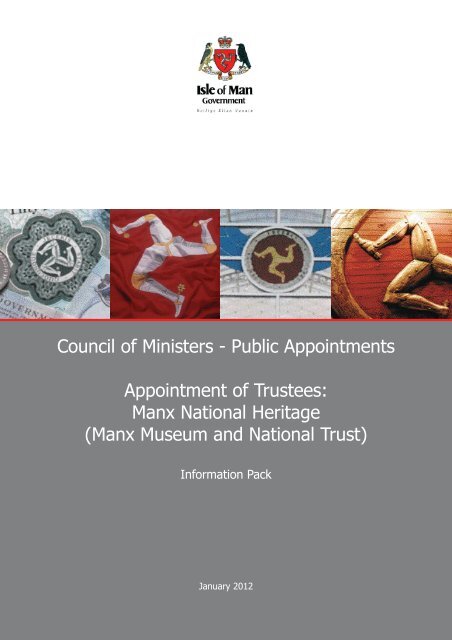

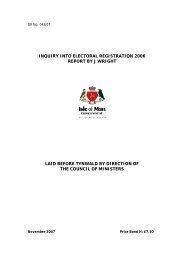
![Smeaton v Equifax CA[2013] EWCA Civ 108](https://img.yumpu.com/22052507/1/184x260/smeaton-v-equifax-ca2013-ewca-civ-108.jpg?quality=85)
